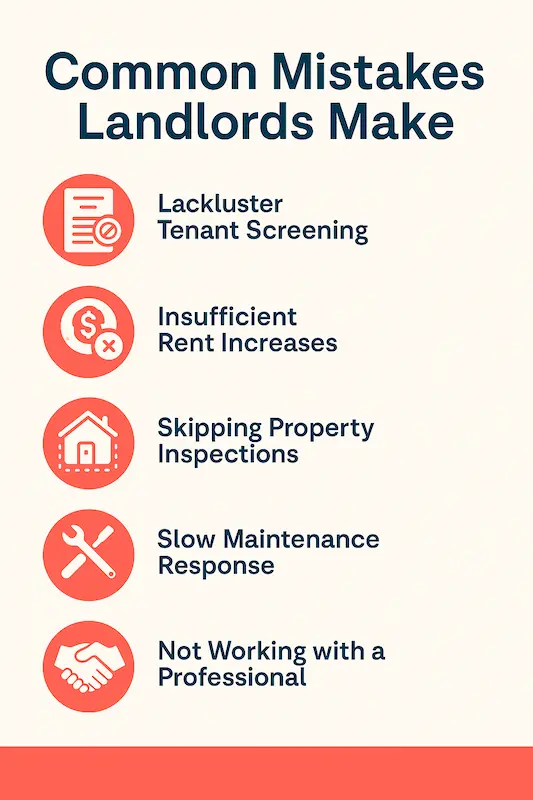
Being a landlord is not for the faint of heart. It might seem simple enough—buy a house, renovate it, and rent it out. But when it comes to successfully managing an investment property, there’s a lot more to it.
We see many pitfalls in self-managed landlords. By knowing—and avoiding—these common mistakes, you can save time, money, and energy on your journey to becoming a successful landlord.
For more information on property management services, reach out to our property management company.
Key Takeaways
- Treat your rental property as a business with proper bookkeeping, clear procedures, and professional leases to avoid costly errors.
- Adhering to fair housing laws and maintaining compliance with local building codes are essential for protecting your property and avoiding legal issues.
- Effective tenant screening, regular maintenance, and prompt lease enforcement help prevent common landlord challenges.
- Partnering with a property management company can simplify day-to-day operations, reduce stress, and improve your rental’s profitability.
Table of Contents
- Treating being a landlord like a hobby
- Not understanding fair housing laws
- Ignoring the local market
- Not marketing your property in its best light
- Not budgeting for potential vacancies
- Not finding the “best” tenants
- Underestimating costs
- Skipping a lease and making handshake deals
- Neglecting your tenants
- Not meeting housing codes
- Not enforcing your lease
- Delaying an eviction
- Not keeping complete records
- Trying to manage too much at once
1. Treating being a landlord like a hobby
When you purchase a rental property, you’re starting a business. Being a landlord is not a hobby; it’s your business, and seeing it that way is important.
When you don’t take your investment property seriously, it can be challenging to turn a profit. But when you invest in building a business, you’ll quickly see a return on your investment.
Start by opening separate bank accounts for deposits and expenses, find a bookkeeping system that works for you, and find a tax professional to help ensure you correctly manage your taxes.
Establish procedures for everything you do—finding applicants, marketing your property, and generating and signing leases. Once you’ve created procedures, document them along with all communications you have with applicants, tenants, and other professionals working on your property.
When you take the time to set up a business to run your rental property, you’ll be able to get the most out of your rental and be an effective landlord for your tenants.
2. Not understanding fair housing laws
One of the first things on your to-do list as a landlord should be to brush up on fair housing and anti-discrimination laws in California. Understanding these laws before accepting rental applications is essential, so neglecting them can be a big mistake for landlords.
Fair housing laws are in place to ensure equal access to housing for all. Both federal and state laws govern access to housing. In California, it is illegal to discriminate against renters and rental applicants based on the following:
|
|
|
When you are renting your property in California, it is illegal to take any of the following actions based on the protected classes listed above:
- Refusing to rent, sell, or negotiate for housing.
- Creating different terms, conditions, privileges, or provisions of services or facilities.
- Denying that housing is available for rental when it is available.
- Refusing to make reasonable accommodations or modifications.
- Stating or advertising a preference, limitation, or discrimination based on membership to a protected class.
- Restricting a person’s housing options in connection with renting a property.
- Persuading a landlord to rent their property to keep a protected class out of a neighborhood—this is called blockbusting.
- Denying or offering less desirable rental terms.
- Denying anyone access to a facility or service related to the rental of property.
Additionally, it is illegal to threaten, intimidate, coerce, or interfere with anyone exercising their fair housing rights.
Once you understand these laws, you’ll be in a better position to effectively interview applicants without asking inappropriate questions that could lead to tenants potentially saying they were denied housing based on discrimination. The general rule of thumb is to treat and communicate with every applicant similarly.
3. Ignoring the local market
When you invest in real estate, you need to understand the local market. You should understand the neighborhoods in the area and, more specifically, the neighborhood in which your property is located. Learning about the local rental market and local area taxes will also help you accurately price your property.
4. Not marketing your property in its best light
If you’re not effectively marketing your rental property, you’re not giving it a fair chance to earn a healthy income. You need to think of your property as a product and market it as such.
Instead of snapping a few pictures on your phone, invest in professional photography to ensure your property looks its best. Take the time to craft a well-written description that includes an error-free description of the property and any amenities.
Consider where your target demographic is looking for homes and advertise there. There are so many ways to find a rental these days that you need to do more than posting on Zillow, Realtor.com, and Craigslist—you need to consider who you want to rent to and where they’re likely to spend their time online.
5. Not budgeting for potential vacancies
When you’re considering purchasing a rental property, part of your mental exercise will involve estimating the cost of your investment per month and the profit you can make by renting it out.
While it’s tempting to multiply your monthly rent rate by 12, you need to factor in potential periods of vacancy—the time when the property is untenanted for any reason.
In an ideal world, your property would have a paying tenant 365 days a year. Still, before you set your rent and purchase an investment property, you need to ensure you can pay the mortgage, property taxes, and basic maintenance costs even if you don’t have a tenant paying rent for a period of time.
Be sure you conduct a cash flow analysis that accounts for potential vacancies to ensure you’re covered.
6. Not finding the “best” tenants
No landlord wants their property sitting vacant—as we mentioned above, that can lead to a dip in cash flow. But rushing to get tenants into your property can also be detrimental.
You want to end up with a qualified tenant in your property, which can take time and due diligence.
When you’re interviewing potential tenants, here are some things to consider before you choose a renter:
- Establish screening criteria and create an application to reflect it.
- Verify employment and residence history.
- Perform a tenant background check.
- Run a tenant credit report.
- Check landlord references and ensure renters have always paid their rent on time.
7. Underestimating costs
Properties need routine maintenance—this is an inescapable fact about homeownership. Whether it’s a routine filter replacement or an emergency replacement of the entire HVAC system, you must consider the expenses of maintaining a rental property.
Make sure your monthly rent covers some of the ongoing maintenance expenses you’ll incur, like painting and cleaning between tenants. Remember, if there are large, one-time costs like replacing an HVAC system, you’ll have to use company money or dip into your savings to cover the expenses.
8. Skipping a lease and making handshake deals
We can’t begin to emphasize this enough—a lease is the most important document you will have as a landlord. It lays out everything from costs and expectations to responsibilities and terms. Forgoing a lease and simply “shaking on it” is not an option for landlords.
A lease agreement helps to protect you and your tenants, and you should always insist on tenants signing a lease agreement before they move in. If you run into an issue with a renter, the lease will allow you to take any necessary legal action. Without that signed lease, it becomes a game of “he said, she said,” and you’ll have difficulty getting much of anything done.
Your lease should include:
| Names and information of all involved parties (landlord, tenants, co-signers). | An outline of all fees, including the security deposit, rent, utilities, and late fees. | Any needed clauses such as smoking, lease breakage, and pet clauses. | An outline of how tenants should handle maintenance issues. |
| An outline of how to step up utility payments. | The start and end dates of the lease agreement. | Outline any insurance requirements (ie. state that tenants are required to get renter’s insurance). | Explain how landlord entry, subletters, and occupancy limits are expected to work at the property. |
Having a professional look over the lease before you send it out to anyone is always a good idea.
9. Neglecting your tenants
Being a landlord is not a set-it-and-forget-it job. When you have tenants living at your property, you need to proactively contact them to check in and keep an eye on the property.
However, you must also be considerate and not violate any Californian laws regarding tenant privacy. You cannot stop by without notice or let yourself into the property without permission. It’s a fine line to walk, but you want to make yourself available to your tenants without becoming overbearing and pushy.
10. Not meeting housing codes
As a landlord, you are responsible for ensuring the property meets building codes and safety standards.
If you don’t take care of the property and it no longer is up to housing codes, your tenants may have grounds to break the lease and sue you for compensation for injury or damages caused by your neglect.
Conduct regular, scheduled inspections so you can monitor the property and ensure it’s in good working order. Having open communication with your tenants will also help—if they feel comfortable with you, they’ll be more willing to open up and reach out when there is an issue at the property.
11. Not enforcing your lease
You went through all that trouble creating an airtight lease, so you must enforce its terms when needed.
Suppose your lease indicates that late rent payments will incur an additional fee; charge that fee. If the lease shows that the house is non-smoking, and you see your tenants smoking inside, enforce the penalty mentioned in the lease.
If your tenants see you’re serious about the lease terms, they will follow suit. Setting and enforcing that standard you want your tenants to uphold is essential.
12. Delaying an eviction
Holding off starting the eviction process as soon as it is legally possible can be costly.
If you’re having issues with a tenant and are unsure how to proceed, contact an eviction attorney sooner rather than later. The process can take time, so getting started as quickly as possible is extremely important.
13. Not keeping complete records
14. Trying to manage too much at once
DIY landlords, or landlords who self-manage their properties, often find themselves overwhelmed by the amount of work that goes into maintaining a rental property. Even if you live in the area, consider yourself handy, and have a flexible schedule that allows you to respond to requests, handling your rental property’s general maintenance and management can quickly take up more time and energy than you originally anticipated.
Thankfully, a property management company can help alleviate most—if not all—of the items on your never-ending to-do list. They can give you back time and energy, and a property management company can also help you save money.
How Can a Property Management Company Help?
When you work with a property management company like Good Life Property Management, you can avoid the costly but common mistakes landlords often make. With decades of experience, our team can help you manage everything from marketing your property and finding the perfect tenant to pricing your property and handling the daily maintenance.
We believe life should be enjoyed, not spent sweating the small stuff. That’s why we set out to make property management easy. We care about you, your property, and your tenant. And we do it all so you can Live the Good Life.
Schedule a call to speak with one of our Good Life experts.
Landlord FAQs
Should I hire a property management company?
Can you be successful as a landlord if you don’t live in the local area?
If you own a rental property but don’t live locally, it is advisable to hire a local property manager to handle the day-to-day management of your property. When you work with a property management company, you can rest assured that a professional is nearby to handle any issues.
What is the 1% rule for real estate investing?
Resources and Useful Links:
California Apartment Association – New laws for the rental housing industry
Steve Welty
Subscribe to our Weekly Newsletter
Join the 5k+ homeowners receiving Local Law Updates and Landlord Tips. Delivered to your inbox every Saturday at 6am PST.
Interested in speaking with an Orange County Real Estate Manager? Get in touch with us:
Orange County Property Management Blogs

Protect Your Real Estate With Estate Planning
Learn how landlords can protect real estate, reduce taxes, and plan for a smooth transfer with smart estate planning strategies.

1031 Exchange Rules in California
What is a 1031 exchange and what rules do Californian investors need to be aware of? We’re covering this and more in our guide to 1031 exchanges in California.

Property Inspections: Regulations and Best Practices
Learn the rules, regulations, and best practices for property inspections. Stay compliant, protect your investment, and keep your rental in top shape.










